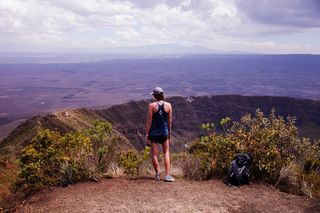
Intelligence
Everything You Do Teaches You
How biological intelligence works.
Posted January 18, 2018

Biological Intelligence
Every moment of your life is a teaching moment for your body. Except most of that teaching is unconscious.
Which is why you hear more about artificial intelligence than biological intelligence.
But biological intelligence, how your body makes and uses information, is far more powerful and personal. Biological information flows in ways we never think about. It even changes the 40 trillion bacteria in your gut who call your body home.
The human body is a vast ecosystem whose parts, more numerously non-human, are always talking to each other.
That’s just a small piece of what we can glean from a recent article by Gretchen Reynolds on exercise and the gut. We know gut bacteria change our immunity. They know they help change our mood. We know they change our weight and our shape.
We also know that exercise changes our heart and our muscles, our immunity and our mood, our liver and our lungs.
Once you get the hang of how biological intelligence works, it comes as no surprise that exercise changes gut bacteria. It happens in ways we may really come to like.
Muscling Up the Gut
Why should exercise grow new brain cells? Why should it change gut bacteria?Because that’s how information flows through biological systems.
In the research described by Reynolds, the effects occur in humans and animals.
In the first series of experiments, germ-free gut mice were transplanted bacteria from two sets of older mice—one group exercising, the other sedentary.
The newly populated guts had rather different responses when subjected to toxic chemicals. Less inflammation appeared in the animals seeded by the exercisers.
In the human study, two small groups of sedentary humans, one lean, the other not, were pushed to exercise for six weeks under observed supervision.
After those six weeks of exercise, the groups had rather different bacterial populations. None changed in precisely the same way.
Microbes that produced short-chain fatty acids, that appear to tamp inflammation and resist insulin resistance (one way to prevent an increased girth) increased in exercisers. It happened more in the group that started off lean.
The changes were temporary. After not exercising for six weeks, the gut bacterial populations were similar to what they had been twelve weeks before.
Which means different human environment = different gut.
So Exercise Changes My Bacterial Population. Why Should I Care?
1. The changes may be beneficial to your health.
2. You may look and feel better.
3. It's another demonstration that the body is always learning.
This concept often trips people up. We think learning is something you do in school. It involves tests and grades. It’s easily measurable.
Unfortunately, this neglects almost everything your body does.
Does your immune system talk to you when it’s fighting off the flu virus? Does it get school grades? Is the AI program which tells you which movie you might like self-aware? Is the influenza virus, which killed at least 50 million in 1918-1919, that routinely gets past our immune system primed by the best vaccines available, completely, totally, and utterly stupid because it doesn’t speak to us?
Intelligence does not have to be self-conscious to be effective. Intelligence is about how information is created and used, often to a purpose.
The Intelligence of Exercise
We don’t think of exercise as “smart.” Oftentimes brawn and brain are seen as competitive, even antithetical.
What a huge mistake.
Exercise is one of the most complicated actions a human body undertakes. Exercise engages all the different organ systems, from brain to immunity. It creates gigantic caches of information that have to be sifted, collated, analyzed and integrated into the information systems that make us smart and keep us alive.
And a lot of that information processing goes on in sleep. Where exercise provokes new brain cells growth. In memory areas.
Which means you get more intelligent while you sleep.
As you do every second of your life. Biological intelligence is always “on” as long as we’re biologically functional. It works when we’re self conscious and not, when we’re awake and asleep, when we’re talking and when we’re silent. Your body is always learning, always upgrading its information to deal with the constantly changing environment.
Which includes your own environment and ecosystem, the trillions of bacteria and viruses and rickettsia and mycoplasma and fungi and protozoans that inhabit you and live inside you.
Which change you as you change them. What you do is what you become. Every act is a teaching act for the body.
Isn't learning fun?



